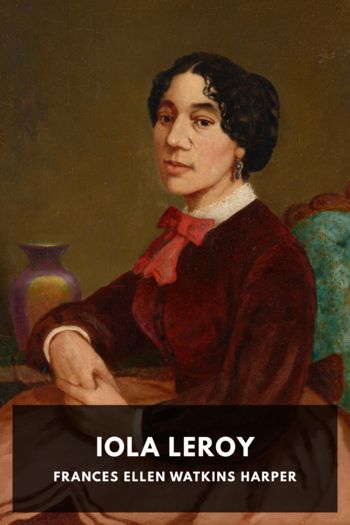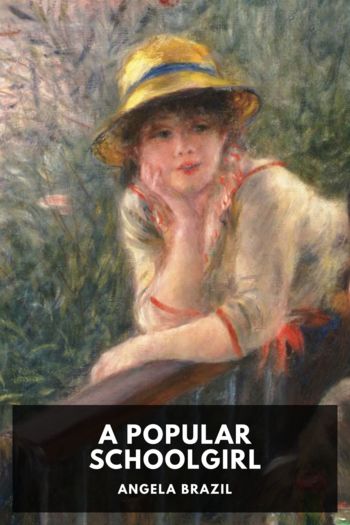Iola Leroy, Frances Ellen Watkins Harper [read aloud books .txt] 📗

- Author: Frances Ellen Watkins Harper
Book online «Iola Leroy, Frances Ellen Watkins Harper [read aloud books .txt] 📗». Author Frances Ellen Watkins Harper
It was a lovely evening for the journey. The air was soft and balmy. The fields and hedges were redolent with flowers. Not a single cloud obscured the brightness of the moon or the splendor of the stars. The ancient trees were festooned with moss, which hung like graceful draperies. Ever and anon a startled hare glided over the path, and whip-poor-wills and crickets broke the restful silence of the night. Robert rode quietly along, quaffing the beauty of the scene and thinking of his boyish days, when he gathered nuts and wild plums in those woods; he also indulged pleasant reminiscences of later years, when, with Uncle Daniel and Tom Anderson, he attended the secret prayer-meetings. Iola rode along, conversing with Aunt Linda, amused and interested at the quaintness of her speech and the shrewdness of her intellect. To her the ride was delightful.
“Does yer know dis place, Robby,” asked Aunt Linda, as they passed an old resort.
“I should think I did,” replied Robert. “It is the place where we held our last prayer-meeting.”
“An’ dere’s dat ole broken pot we used, ter tell ’bout de war. But warn’t ole Miss hoppin’ wen she foun’ out you war goin’ to de war! I thought she’d go almos’ wile. Now, own up, Robby, didn’t you feel kine ob mean to go off widout eben biddin’ her goodbye? An’ I ralely think ole Miss war fon’ ob yer. Now, own up, honey, didn’t yer feel a little down in de mouf wen yer lef’ her.”
“Not much,” responded Robert. “I only thought she was getting paid back for selling my mother.”
“Dat’s so, Robby! yore mudder war a likely gal, wid long black hair, an’ kine ob gingerbread color. An’ you neber hearn tell ob her sence dey sole her to Georgia?”
“Never,” replied Robert, “but I would give everything I have on earth to see her once more. I do hope, if she is living, that I may meet her before I die.”
“You’s right, boy, cause she lub’d you as she lub’d her own life. Many a time hes she set in my ole cabin an’ cried ’bout yer wen you war fas’ asleep. It’s all ober now, but I’se gwine to hole up fer dem Yankees dat gib me my freedom, an’ sent dem nice ladies from de Norf to gib us some sense. Some ob dese folks calls em nigger teachers, an’ won’t hab nuffin to do wid ’em, but I jis’ thinks dey’s splendid. But dere’s some triflin’ niggers down yere who’ll sell der votes for almost nuffin. Does you ’member Jake Williams an’ Gundover’s Tom? Well dem two niggers is de las’ ob pea-time. Dey’s mighty small pertaters an’ few in a hill.”
“Oh, Aunt Linda,” said Robert, “don’t call them niggers. They are our own people.”
“Dey ain’t my kine ob people. I jis’ calls em niggers, an’ niggers I means; an’ de bigges’ kine ob niggers. An’ if my John war sich a nigger I’d whip him an’ leave him.”
“An’ what would I be a doin’,” queried John, suddenly rousing up at the mention of his name.
“Standing still and taking it, I suppose,” said Iola, who had been quietly listening to and enjoying the conversation.
“Yes, an’ I’d ketch myself stan’in’ still an’ takin’ it,” was John’s plucky response.
“Well, you oughter, ef you’s mean enough to wote dat ticket ter put me back inter slavery,” was Aunt Linda’s parting shot. “Robby,” she continued, “you ’member Miss Nancy’s Jinnie?”
“Of course I do,” said Robert.
“She married Mr. Gundover’s Dick. Well, dere warn’t much git up an’ go ’bout him. So, wen ’lection time com’d, de man he war workin’ fer tole him ef he woted de radical ticket he’d turn him off. Well, Jinnie war so ’fraid he’d do it, dat she jis’ follered him fer days.”
“Poor fellow!” exclaimed Robert. “How did he come out?”
“He certainly was between two fires,” interposed Iola.
“Oh, Jinnie gained de day. She jis’ got her back up, and said, ‘Now ef yer wote dat ticket ter put me back inter slavery, you take yore rags an’ go.’ An’ Dick jis’ woted de radical ticket. Jake Williams went on de Secesh side, woted whar he thought he’d git his taters, but he got fooled es slick es greese.”
“How was that?” asked Robert.
“Some ob dem folks, dat I ’spects buyed his wote, sent him some flour an’ sugar. So one night his wife hab company ter tea. Dey made a big spread, an’ put a lot ob sugar on de table fer supper, an’ Tom jis’ went fer dat sugar. He put a lot in his tea. But somehow it didn’t tase right, an’ wen dey come ter fine out what war de matter, dey hab sent him a barrel ob san’ wid some sugar on top, an’ wen de sugar war all gone de san’ war dare. Wen I yeard it, I jis’ split my sides a larfin. It war too good to keep; an’ wen it got roun’, Jake war as mad as a March hare. But it sarved him right.”
“Well, Aunt Linda, you musn’t be too hard on Uncle Jake; you know he’s getting old.”
“Well he ain’t too ole ter do right. He ain’t no older dan Uncle Dan’el. An’ I yered dey offered him $500 ef he’d go on dere side. An’ Uncle Dan’el wouldn’t tech it. An’ dere’s Uncle Job’s wife; why didn’t she go dat way? She war down on Job’s meanness.”
“What did she do?”
“Wen ’lection time ’rived, he com’d home bringing some flour an’ meat; an’ he says ter Aunt Polly, ‘Ole woman, I got dis fer de wote.’ She jis’ picked up dat meat an’ flour an’ sent it sailin’ outer doors, an’ den com’d back an’ gib him a good tongue-lashin’. ‘Oder people,’ she said, ‘a wotin’ ter lib good, an’ you a sellin’ yore wote! Ain’t you got ’nuff ob ole Marster, an’ ole Marster





Comments (0)